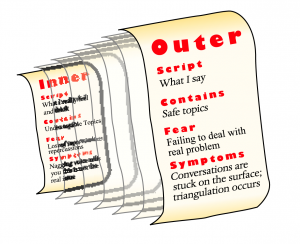
Inner Scripts
Leaders can use this tool to help people express their underlying conflicts and resolve them. It gives people a way to talk about their differences without triggering defensive responses. When used regularly, Inner Scripts can dramatically increase morale and cut down on the time spent dealing with conflicts. Click Here To Download The PDF.
What are Inner Scripts?
 Imagine a situation where you feel obligated to do something – yet you strongly disagree with it. Perhaps you were told to sell a new product to a trusted account. But you think the product is badly flawed. Due to fear of reprisals from your boss, or embarrassment in front of your peers, you feel afraid to bring up your concerns. When you talk about it publicly, you express enthusiasm. But to yourself you think, “this situation stinks.” That’s your Inner Script.
Imagine a situation where you feel obligated to do something – yet you strongly disagree with it. Perhaps you were told to sell a new product to a trusted account. But you think the product is badly flawed. Due to fear of reprisals from your boss, or embarrassment in front of your peers, you feel afraid to bring up your concerns. When you talk about it publicly, you express enthusiasm. But to yourself you think, “this situation stinks.” That’s your Inner Script.
Inner Scripts place you in a “no-win” situation.
As far as you’re concerned, you lose face if you talk to your boss, and you lose face if you present the product to your customer.
So what should you do?
The right course of action is to communicate your concern to your boss using a technique that will trigger his desire to help you, rather than a defensive reaction. Inner Scripts provides you with a mechanism to do this.
How should I express an Inner Script?
To express an Inner Script effectively, you need to focus people’s attention on your fears and feelings of pain. The pain is obvious – you’re caught in a dilemma in which you see no comfortable way out. By communicating your Inner Script in such a way that causes people to want to help you, you will get the resolution you need. So express it this way: First, say:
“I have an Inner Script.”
This alerts your boss that you attach a lot of emotional importance to what you’re about to say. Then express your script in the form of a dilemma. Using the example above, you might put it in these terms:
“My dilemma is this. While I want to sell this product, I fear it will jeopardize my relationship with a key customer. By bringing up this issue, I fear reprisals from you. This pains me greatly, because I want to be successful and I want our company to be successful. Please help me see a way out of this dilemma.”
Assuming you have a reasonable boss, this will trigger a discussion that will help you – and help the company – resolve this conflict. If you’re not entirely comfortable with the outcome, continue to express your fears and feelings of discomfort. A reasonable boss knows that you’ve got to be in your comfort zone to be fully effective.
Hint: If you think your boss is unreasonable, seek out a trusted advisor within the company and ask for help. The human resources manager might be one such person. Express your dilemma and express also the need to be able to resolve these kinds of issues in general. The human resources manager may be able to suggest an executive coach for your boss who can help him mend his ways.
How do Inner Scripts affect productivity?
We are psychologically hard wired to feel good about our decisions. When you have an Inner Script, you are in what psychologists call “dissonance.” Essentially, you are in conflict with yourself. Inner Scripts are insidious because they are paralyzing. They cause people to think: “Until we resolve this issue, I can’t move forward. I’m going to do the bare minimum to get by.” A spiraling down of productivity is the inevitable result. When you express it, you are taking steps to resolve the conflict – and restoring cognitive and emotional balance.
The implication for leaders is this: You have a responsibility to empower people to express their Inner Scripts. By communicating your interest in hearing Inner Scripts and modeling this skill yourself, you will take a big step forward in boosting morale, improving productivity and reducing turnover.
Hint: Inner Scripts are described in detail in the book Straight Talk: Turning Communication Upside Down for Strategic Results. Leading Resources Inc. offers the Straight Talk® workshops to teach leaders and teams advanced communication skills, using tools like Inner Scripts.
| Lesson 16: Managing Meetings | Lesson 18: Setting Ground Rules |
5 Comments
Add yours+ Leave a Comment
You must be logged in to post a comment.


[…] Lesson 17: Inner Scripts […]
[…] Lesson 17: Inner Scripts […]
[…] best way to communicate with anyone whose style differs from yours is to put into words the dilemma you feel. For example, if you’re talking to a […]
[…] trick is to learn how to express our “inner scripts” – the things that might embarrass us if we express them – in a way that shows we are […]
[…] tenth ground rule encapsulates one of our tools – Inner Scripts. Getting people to divulge their Inner Scripts gets them pointed toward straight talk. This is one rule that everyone must adhere to – or no […]